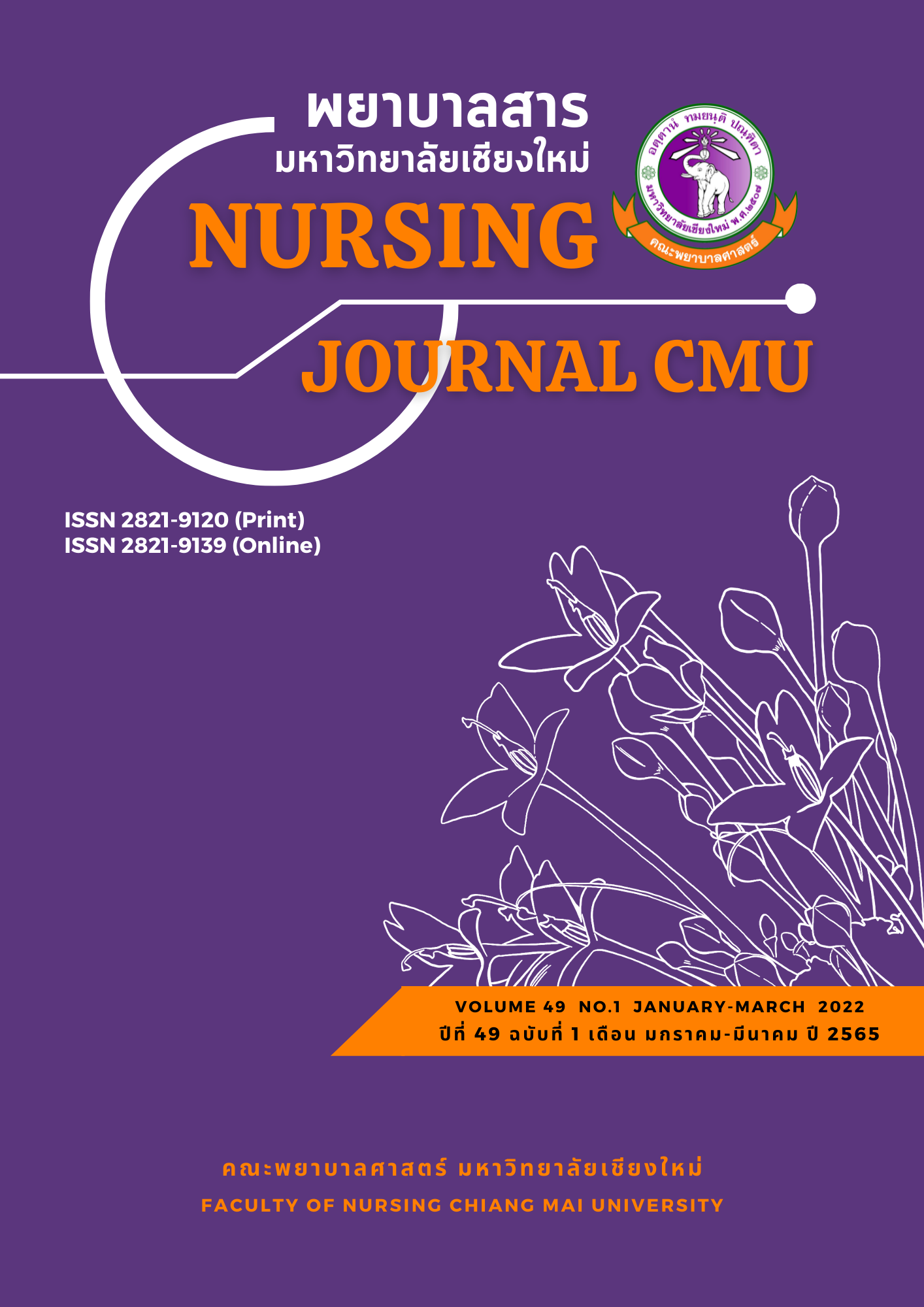Psychiatric Nurses’ Roles in Using Digital Technology in Mental Health Promotion and Psychiatric Illness Prevention
Keywords:
Mental health promotion, Mental illness prevention, Nurse role, Psychiatric nursesAbstract
This article presents guidelines for using digital technology to promote mental health and prevent mental illness for psychiatric nurses. Currently, the institute of mental health care has developed digital technology such as websites and apps, especially self-help digital interventions, for enhancing the mental health care skills of people, including digital technology in mental health promotion that focuses on providing information about mental health promotion; digital technology in mental illness prevention that focuses on mental health assessment and self-care guidance; and digital technology that provides online therapy for severe mental illness prevention. Therefore, psychiatric nurses who play a role in mental health services have to integrate digital technology into their services to promote mental health and prevent mental illness by supporting the use of digital media to develop personal skills in mental health promotion and prevention for people. They can also enhance the potential of their work and professional development by using digital technology in nursing services. However, the use of digital technology should include awareness of the quality of digital technology, the suitability of target groups, as well as ethics. Psychiatric nurses have to keep up the standard of psychiatric nursing services, especially with the use of technology.
References
American Psychiatric Nurses Association (APNA). (2019). Standards of psychiatric nursing practice 2019.
Retrieved from https://crpnm.mb.ca/wp-content/uploads/2019/10/Standards-of-Psychiatric-Nursing-Practice-FINAL-October-2019.pdf
Chipise, E., Wassenaar, D., & Wilkinson, A. (2019). Towards new ethics guidelines: The ethics of online therapy in south Africa. South African Journal of Psychology, 49(3): 337–352.
Datareportal. (2021). Digital 2021: Thailand. Retrieved from https://datareportal.com/reports/digital-2021-Thailand (in Thai)
Department of Mental Health. (2016). Strategic plan, Department of Mental Health, Vol.12 (2017-2021). (in Thai) Retrieved from https://www.dmh.go.th /report/opdnew/
Department of Mental Health. (2020). New psychiatric outpatients case report. Office of information
technology, Department of Mental Health. (in Thai) Retrieved from https://www.dmh.go.th/report/opdnew/
Health Promotion Foundation. (2017). Promotion mental health: Concepts-emerging evidence practice summary report. Chiang Mai: Wanidakarnpim. (in Thai)
Hollis, C., Falconer, C. J., Martin, J. L., Whittington, C., Stockton, S., Glazebrook, C., & Davies, E. B. (2017). Annual research review: Digital health interventions for children and young people with mental health problems - A systematic and meta-review.
Journal of Child Psychology and Psychiatry, and Allied Disciplines,58(4), 474–503. doi.org/10.1111/jcpp.12663
James, A. C., Reardon, T., Soler, A., James, G., & Creswell, C. (2018). Cognitive behavioral therapy for anxiety disorders in children and adolescents. The Cochrane Database of Systematic Reviews, 2018(10), CD013162. doi.org/10.1002/14651858.CD013162
Kenny, R., Dooley, B., & Fitzgerald, A. (2016). Developing mental health mobile apps: Exploring adolescents' perspectives. Health Informatics Journal, 22(2), 265–275. doi.org/10.1177/1460458214555041
Ministry of Public Health. (2016). The standards of mental health promotion and mental health problem prevention for community hospital (revise).Nonthaburi, Bureau of Mental Health Promotion and Development. Ministry of Public Health. (in Thai)
Muhorakeye, O. & Biracyaza. E. (2021). Exploring barriers to mental health services utilization at Kabutare District Hospital of Rwanda: Perspectives from patients. Frontiers Psychology. doi.org/10.3389/fpsyg.2021.638377
National Statistical Office. (2021). The 2021(Quarter 2) Household survey on the use of information and communication technology. (in Thai) Retrieved from https://shorturl.asia/pJD85
Office of the National Economic and Social Development Board Office of the Prime Minister Bangkok, Thailand. (n.d.). Summary of the twelfth national economic and social development plan (2017-2021). (in Thai) Retrieved from https://www.nesdc.go.th/ewt_news.php?nid=7240
Phothichak, S. (2021). The varying of stress with outbreaks. (in Thai) Retrieved from https://www.dmh.go.th/news/view.asp?id=2412
Sobowale, K., Nguyen, M., Weiss, B., Van, T., & Trung, L. T. (2016). Acceptability of internet interventions for youth mental health in Vietnam. Global mental health (Cambridge, England), 3, e22. doi.org/10.1017/gmh.2016.18
Srivanichakorn, S. (2021). Mental health and primary care / family medicine. PCFM,4,1. pp 4-7. (in Thai) Retrieved from https://so03.tci-thaijo.org/index.php/PCFM/article/view/251344/168607
The National Institute of Mental Health (NIMH). (2019). Technology and the future of mental health treatment. (in Thai) Retrieved from https://bit.ly/3l0WwLQ
World Bank. (2019). Individuals using the Internet (% of population). Retrieved from https://data.worldbank.org/indicator/IT.NET.USER.ZS
World Health Organization. (2017). Promotion mental health: Concepts emerging evidence practice summary report. Chiang Mai, Wanida karnpim. (in Thai)
World Health Organization. (2018). Mental health: Strengthening our response. Retrieved from https://www.who.int/en/news-room/fact-sheets/detail/mental-health-strengthening-our-response
Downloads
Published
How to Cite
Issue
Section
License
Copyright (c) 2022 Nursing Journal

This work is licensed under a Creative Commons Attribution-NonCommercial-NoDerivatives 4.0 International License.
บทความที่ได้รับการตีพิมพ์เป็นลิขสิทธิ์ของวารสารพยาบาลสาร
ข้อความที่ปรากฏในบทความแต่ละเรื่องในวารสารวิชาการเล่มนี้เป็นความคิดเห็นส่วนตัวของผู้เขียนแต่ละท่านไม่เกี่ยวข้องกับมหาวิทยาลัยเชียงใหม่ และคณาจารย์ท่านอื่นๆในมหาวิทยาลัยฯ แต่อย่างใด ความรับผิดชอบองค์ประกอบทั้งหมดของบทความแต่ละเรื่องเป็นของผู้เขียนแต่ละท่าน หากมีความผิดพลาดใด ๆ ผู้เขียนแต่ละท่านจะรับผิดชอบบทความของตนเองแต่ผู้เดียว






